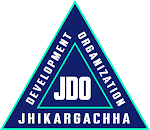In the village of Rishipara, located in the Mallikpur region of Jhikargacha union, Jhikargacha upazila in Jashore district, a significant social improvement initiative has been successfully implemented. Through the concerted efforts of the Jhikargacha Development Organization (JDO), funded by the Bangladesh NGO Foundation (BNF), 16 families have been provided with free sanitary semi-pucca latrines. This project marks a notable step forward in improving public health, sanitation, and overall quality of life for these families, while also aligning with several Sustainable Development Goals (SDGs) set by the United Nations.
The benefits of this project extend beyond health, contributing to SDG 1: No Poverty. Access to sanitation facilities can have a profound impact on economic stability and poverty reduction. When families are healthier, they can participate more effectively in economic activities, reducing the financial burden of medical expenses and lost labor productivity due to illness. Improved sanitation also has a ripple effect on education, as healthier children are more likely to attend school consistently, leading to better educational outcomes and increased opportunities for future employment.
In addition to the immediate health and economic benefits, this project promotes SDG 5: Gender Equality. In many communities, the lack of private sanitation facilities disproportionately affects women and girls, who often face safety risks and social stigmas when forced to defecate in the open or in inadequate facilities. By providing safe and hygienic latrines, the JDO and BNF are helping to ensure that women and girls can manage their sanitation needs with dignity and security. This improvement in sanitation can also reduce the time spent on fetching water and dealing with health issues, thereby allowing women to engage more fully in educational and economic activities.
The donor organization, Bangladesh NGO Foundation (BNF), deserves commendation for its role in funding this project. BNF has a strong track record of supporting grassroots initiatives that address critical social and economic issues in Bangladesh. Their funding of this sanitation project is a testament to their commitment to improving the lives of vulnerable populations. BNF's approach is noteworthy for its focus on sustainable development, community empowerment, and capacity building, which ensures that the benefits of their projects are long-lasting and transformative.
BNF's support for the JDO in this project is also a reflection of their strategic partnerships with local organizations that have a deep understanding of the community's needs. This collaborative approach ensures that interventions are contextually appropriate and effectively address the specific challenges faced by the community. By empowering local organizations like the JDO, BNF helps to build local capacity and foster a sense of ownership and accountability within the community.


.png)


Post a Comment